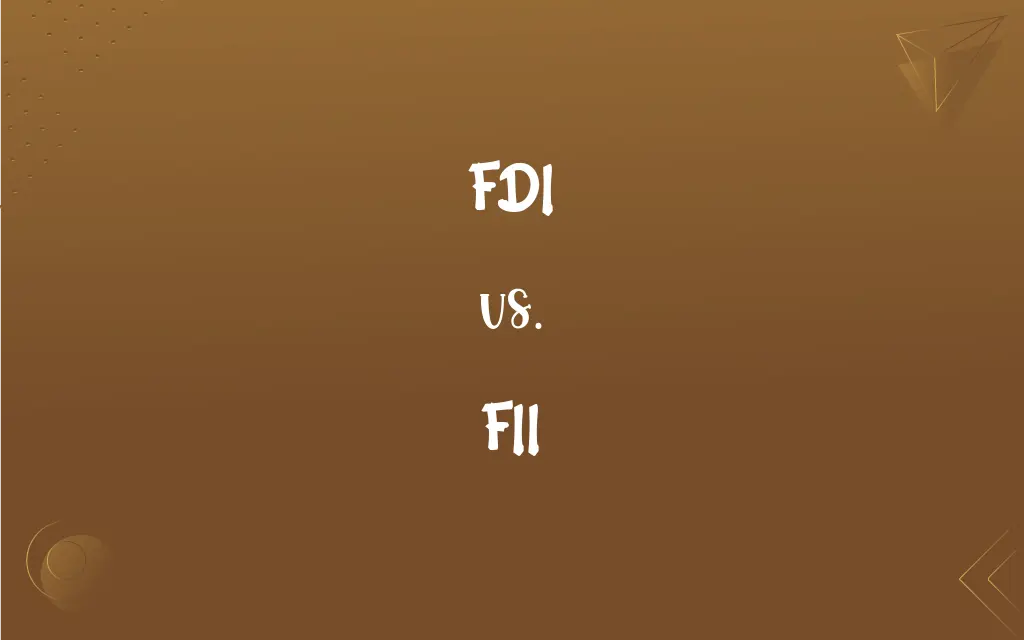FDI vs. FII: What's the Difference?
Edited by Aimie Carlson || By Harlon Moss || Updated on October 23, 2023
FDI (Foreign Direct Investment) is when a company invests directly in a foreign country's business or assets, whereas FII (Foreign Institutional Investment) involves foreign entities investing in a country's financial markets.

Key Differences
FDI, or Foreign Direct Investment, refers to the investment made by a company or individual in business interests in another country, often by either buying a company or establishing new operations. On the other hand, FII, or Foreign Institutional Investment, signifies investment by foreign institutions primarily in the financial markets of a country.
While FDI is characterized by a direct stake and long-term interest in the economic growth of another country, FII is more transient, often driven by short-term financial gains. FDI leads to the influx of capital and expertise, often fostering job creation and technological advancement in the host country.
Conversely, FII, being more volatile, can lead to rapid market fluctuations based on global financial conditions.
FDI is a commitment to a foreign country's economy at a fundamental level, whereas FII is more about gaining from financial market movements.
Comparison Chart
Definition
Direct investment in business or assets.
Investment in financial markets.
ADVERTISEMENT
Duration
Generally long-term.
Often short-term.
Impact
Can lead to job creation and tech advancement.
Can lead to rapid market fluctuations.
Nature
Stable and less liquid.
More volatile and liquid.
Regulatory Body
Usually overseen by economic or trade ministries.
Typically managed by securities market regulators.
FDI and FII Definitions
FDI
FDI leads to direct capital inflow into a country.
FDI played a crucial role in the nation's economic resurgence.
ADVERTISEMENT
FII
FII can influence market dynamics due to its volatile nature.
The sudden dip was a result of decreased FII.
FDI
FDI involves acquiring or setting up new business operations abroad.
The US company's FDI in Germany boosted local employment rates.
FII
FII is the flow of funds from abroad into a country's securities.
The stock market boomed due to increased FII.
FDI
FDI can be an acquisition, merger, or a greenfield investment.
Their FDI strategy focused on acquiring local startups.
FII
FII focuses on stocks, bonds, and other financial instruments.
The bond market benefited significantly from FII.
FDI
FDI is a long-term commitment to another country's economy.
The government encourages FDI to promote sustainable growth.
FII
FII investments are generally more liquid than FDI.
Economic uncertainties led to a rapid outflow of FII.
FDI
FDI often involves tangible assets like machinery and infrastructure.
The FDI project resulted in a new factory being built.
FII
FII is primarily driven by foreign institutional investors.
Recent regulatory changes attracted more FII.
FAQs
Which investment can influence stock market movements?
FII can influence stock market dynamics due to its volatile and liquid nature.
What is FDI?
FDI is Foreign Direct Investment, where a company or individual invests directly in another country's business or assets.
What is FII?
FII is Foreign Institutional Investment, where foreign entities invest in a country's financial markets.
Which type of investment might be preferable for developing nations?
While both are beneficial, FDI is often preferred in developing nations due to its stability and long-term benefits.
Are FDI and FII the only types of foreign investments?
No, other forms like foreign portfolio investment (FPI) and external commercial borrowings (ECB) also exist.
What sectors typically attract the most FDI?
Sectors like manufacturing, technology, and energy often attract significant FDI.
Can political stability influence FDI and FII?
Yes, political stability can boost investor confidence, potentially attracting more FDI and FII.
Can FDI lead to technology transfer?
Yes, FDI can foster technology transfer and expertise sharing between countries.
Do countries regulate the amount of FDI and FII?
Yes, many countries have regulatory frameworks for both FDI and FII to protect their economic interests.
Which has a more immediate impact on currency value?
FII, due to its liquid nature, can have a more immediate impact on a country's currency value.
How do exchange rates impact FII?
Favorable exchange rates can make a country's securities more attractive, drawing in more FII.
Is FDI more stable than FII?
Generally, FDI is considered more stable than FII due to its long-term nature.
Is FDI always in the form of buying companies?
No, FDI can also involve setting up new business operations or merging with local companies.
Which investment type can result in foreign ownership control?
FDI can result in foreign ownership control, especially in sectors with significant FDI inflows.
How do FDI and FII influence a country's balance of payments?
Both FDI and FII result in capital inflows, affecting the capital account of a country's balance of payments.
Can FDI and FII coexist in an economy?
Yes, both FDI and FII can coexist, and many economies have a mix of both.
What are the benefits of FDI for a host country?
Benefits include job creation, technology transfer, infrastructure development, and economic growth.
Why might a country restrict FII?
To safeguard against financial market volatility and speculative activities.
How is FII different from foreign portfolio investment (FPI)?
FII is a broader category, while FPI specifically refers to investments in a country's securities, such as stocks and bonds.
Which investment type can impact job creation directly?
FDI can directly impact job creation, especially when it involves setting up new operations or facilities.
About Author
Written by
Harlon MossHarlon is a seasoned quality moderator and accomplished content writer for Difference Wiki. An alumnus of the prestigious University of California, he earned his degree in Computer Science. Leveraging his academic background, Harlon brings a meticulous and informed perspective to his work, ensuring content accuracy and excellence.
Edited by
Aimie CarlsonAimie Carlson, holding a master's degree in English literature, is a fervent English language enthusiast. She lends her writing talents to Difference Wiki, a prominent website that specializes in comparisons, offering readers insightful analyses that both captivate and inform.































































